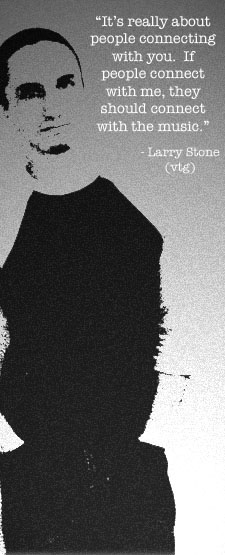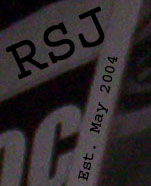|

Larry Stone used to be in a hardcore band. But after putting in six years only to see this project dissolve, he decided
he would rather go it alone -- a boy, his computer, and a bedroom full of synths. Thus, vtg was born and introduced to the
public via Digital Brothel Records release, "So Beautiful People Look Away." Citing influences ranging from Nine
Inch Nails to Faith No More, Stone knows that he's hardly the first to jump in the overcrowded electronica pool, but he hopes
his diverse musical background will create a sound setting him apart from the masses. Rock Star Journalism spoke with Stone
as well as remixer and DBR label head Rob Ferent.
Rock Star Journalism: Describe what genre you think your music falls into.
Larry Stone: I think it's probably electro industrial breaks. Maybe some trip-hop for a little flavor.
RSJ: Do you try to create a different sound with the instrumental pieces than you do with those that have vocals?
LS: One of the instrumental pieces, "It's A Shame," that's written almost entirely with a program called Csound,
which is kind of an arcane MIT language of text-based synthesis. I wrote that with Matt Ganucheau, so we created all the synthesizers
from scratch that you're hearing on that, and then we re-processed a lot of drum loops through Csound as well. So, that was
kind of an experiment. And then another instrumental, "Trapt," was more of a trip-hop/hip hop feel. Rob did a
remix of the other one, "Letting Go."
RSJ: Rob, can you tell us about your musical contribution to this album?
Rob Ferent: I pretty much remixed track number eight, which is "Loudly" and eleven, "Letting Go" and
the hidden track, "Hush Hush." I wrote the original version, but the version that's on the cd is all Larry.
 RSJ: You have a very professional sound; what kind of set-up are you using?
LS: Everything was recorded in my bedroom on a home built computer with some monitors and a mouse and a bunch of software
synths. I went to school for engineering, so that's probably why it sounds professional, even though we didn't use any real
professional gear. But we brought it to a great mastering guy; he did a really good job on it. Kudos to him for really bringing
it up to that level.
RSJ: Now that you have your first album out, are you satisfied with the results?
LS: Yeah, I'm really happy. What do you think Rob?
RF: I think the album's great. I mean, I always thought it was great though, so obviously, the finished product I'm pleased
with.
LS: It's funny, it took so long to get out and for me to actually finish something; it's kinda strange, holding it in
your hands now. It kinda feels bizarre. And then when I listen to it, it's even more bizarre (laughs).
RSJ: We know you had some hold-ups in getting the album released. What did you find to be the biggest difficulty?
RF: The biggest problem, I'd have to say was the artwork. Even though the art guy was fantastic and did an amazing job
it just seemed like, I don't know, the printer people would tell us one thing, and then we'd set up the artwork that way,
and then it was no good. And then they needed to change something else so we'd have the art guy change whatever was the
problem, and then we'd send it back and they'd find something else that needed to be changed. So, what should have been done
in about a month took about four. That was definitely the biggest pain in the ass.
RSJ: How has the response been so far?
RF: The response has been positive. Everybody who's had anything to say about the album has had nothing but good things
to say, which is always nice. We're kinda just waiting for that bad review. Cause, I mean, we obviously want that constructive
criticism, but if nobody has anything bad to say, that's good to me (laughs).
LS: I'm waiting for the hate mail.
RSJ: What kinds of marketing do you use to get the word out about the album?
RF: I haven't really solidified any grand or genius plan, but we've done some online kind of marketing where I've gotten
a street team somewhat together and they spread the word. But we don't spam, cause I think spam sucks and I hate getting
it, so I don't really want to give it to people. And they'll be an ad for the vtg cd in the upcoming issue of Outburn Magazine.
And vtg's also going to be in either the next issue or the following issue of Rock Sound magazine in the UK. Things are moving
slowly, but we're trying to market it more in just a person to person kind of scenario, as opposed to any grand crazy ideas
or anything that's gonna take a whole lot of cash.
RSJ: Do you get airplay on any local radio stations?
RF: We haven't yet. We're still very new and trying to get all this stuff out; we definitely have a list a mile long
of radio stations that will be receiving the cd soon.
RSJ: Larry, are you interested in touring right now?
LS: I really am, yeah. I love playing. I think one of the things that I gave up with just doing electronica music was
having a band to play with. And that was what I loved. The reason I haven't gone into that yet is because I'm gonna be moving
to San Francisco in a month, and I'm waiting to get out there to set up a touring band. I have a few ideas of people I'd
like to tour with and hopefully they're up for the idea as well. But, I'm hoping for it to be a cool show without having
to follow tapes in the back. I'd rather it be more of a live show with real instruments.
RSJ: Other than VTG, you've done some work with The Findings. How did you get involved with that?
LS: I went to school with Erin and Luke, actually. And they're both really talented; Erin's a wonderful singer. We were
hanging out and she was really getting interested in Portishead, and I was showing her some trip-hop stuff. And they told
me about the album they were doing, and they asked me to co-write a few songs. It was fun working with them; it was different.
I've never worked with a folk-rock act.
RSJ: You create your own software as well. What can you tell us about The Oxygenator?
LS: That's not released yet. The Oxygenator is a piece of software for live performance with Reason and Ableton Live.
It basically adds the ability to send more midi messages with one controller. It was written with Max/MSP, which is a pretty
cool programming language.
RSJ: Do you have a background in software design?
LS: No, I'm just a dork (laughs). Where I went to school there was a synthesis department, and I wasn't a synthesis major,
but I used to try to hang around and sit in on classes and hang out with the kids. One day someone introduced it to me, and
I lost a whole summer learning as much as I could. And when I emerged from the depths of my room that's what I had. Which
isn't really that much for a whole summer, but it's pretty cool. I should be releasing that in a few months, hopefully.

RSJ: Obviously, there are a lot of small bands trying to make it. What do you think you bring to the table that other
people don't?
LS: That's a good one. I don't think I've ever been asked that question before. I guess, when I listen to it, it's like
nothing I've heard before, so I've got that going for me. I definitely put a lot of myself into the music; I put a lot of
heart into it. Hopefully that conveys itself to the listener; hopefully they can connect with it. I guess it's really about
people connecting with you. If people connect with me, they should connect with the music or vice versa.
RSJ: What's the hardest thing about being in the music industry right now?
LS: Definitely getting noticed. Getting any type of press. Cause we all know who runs the industry. I think it's down
to three major labels right now and money talks, unfortunately. I'm lucky to have Rob to take care of all that promotion
stuff. He's good at that; I don't even deal with it.
RSJ: Has it been difficult doing this in an area that isn't known for a big electronic scene?
LS: Yeah, that's why I'm leaving. Boston's an awesome city for live music if you're into emo or hardcore or punk or rockabilly
even. But, man, they are hard on electronic musicians. I don't know, maybe something doesn't pull them here. Maybe it's
the weather. But I find a lot of the electronic music is over on the west coast and especially over in Europe too. You know,
I think if there were enough people here to start the scene, Boston would embrace it.
RF: I keep looking around trying to figure out, where's my target demographic here in Massachusetts? And I'm like, shit,
there isn't one. So, it has been a problem. But there are a few small places, and I'm gonna start trying to target them
and hopefully maybe convert some of those hardcore music fans or punk music fans into listening to what we've got.
RSJ: What's been the greatest learning experience within this whole process?
RF: Don't pay an art guy until all the artwork is done.
LS: The greatest learning experience...Rob, you gotta help me out with this one, I don't even really know what to say
to that.
RF: I don't have any more one-liners left, Larry.
LS: You know what? I finished something, finally. That was a really nice learning experience. That there's actually
a reward when you do something and finish it. It's nice to have something done.
RSJ: Finally, tell us one band that you currently enjoy that you could never admit to [argumentative industrial message
board] The Sick City.
LS: I wouldn't admit much to them.
RF: Yeah, Larry knows better.
LS: I stay away and let Rob be my mediator to The Sick City. Cause I've seen them in action.
RF: That's a tough question to answer cause I've pretty much admitted every horrific thing I listen to to them. But
I don't know if I've ever mentioned my obsession with Missing Persons.
LS: You know, I do have an Ol' Dirty Bastard cd that I do listen to regularly. I'm sure they wouldn't want to hear that.


|

